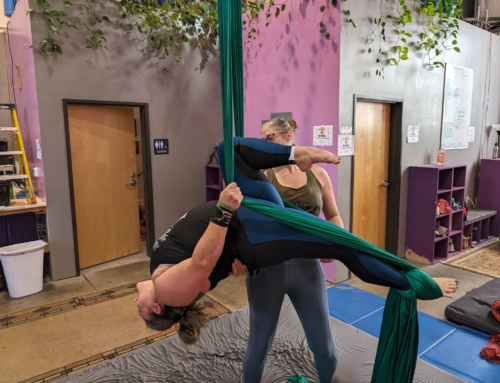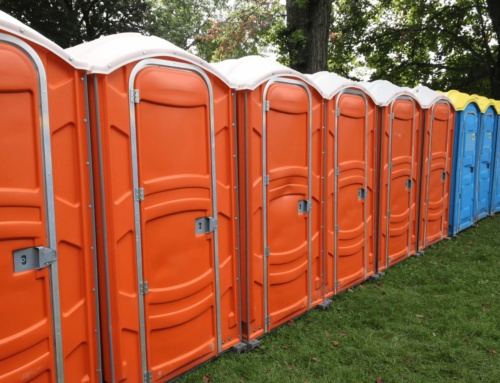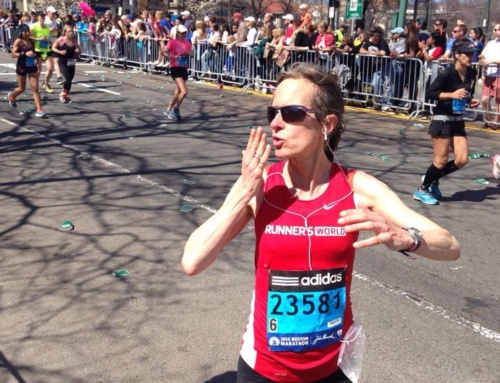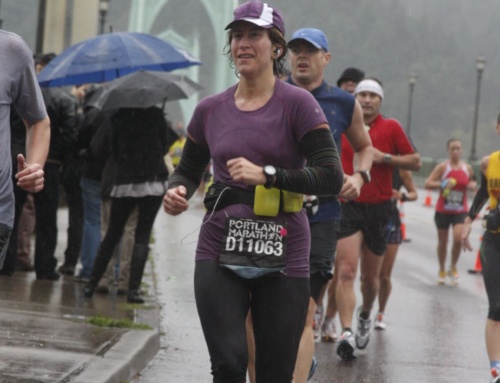Our Mother Runner of the Month this month is one who has struggled mightily with our sport—and is willing to be open and honest about it.
Amy Landes, a 47-year-old nurse and mother of three (ages 24, 21, and 19) in St. Louis, Missouri, was nominated by her older sister, Melanie.
“In May of 2018, my sister set a new PR in the Illinois Marathon, winning the master’s division in 3:03.35. She was 46,” Melanie writes, “Three months later, she stopped running, and entered recovery for a 15-year eating disorder. She courageously faced her disease—and gave up her beloved activity of running—because she knew she needed to be a mother first, and that continuing her disorder was killing her.
Amy exemplifies courage, strength, and a driving love for her children, making her the #motherrunner I admire most.”
We reached out to Melanie to make sure Amy was ok with talking publically about her illness, and despite a recent relapse, she was.
Before we dive in, we wanted to share this disclaimer from Amy. “Everything I say about Eating Disorders (ED) and recovery here is my story only, and I think a lot can apply with other adults with eating disorders, but I can’t speak with any appropriate knowledge or authority on teens/kids with eating disorders.”

Melanie and Amy, sharing smiles after 2017 Go! St. Louis Marathon.
First Miles: I started running a little bit between my second and third kids, so about 20 years ago. I was mildly interested at the time. My older sister Melanie had been a runner since high school and was training for her first marathon, and a good friend of mine was running. They both seemed to love the sport and encouraged me to join up. I stopped during my pregnancy with #3, and started up again afterward. I ran my first marathon in 2002.
Natural Talent: I think maybe I knew I was a good runner after my first marathon. I finished with a decent time and didn’t feel like it was too hard, so for my second marathon I made a time goal and was able to reach that with relative ease.
Sister Act: When we lived close to each other, Melanie and I did weekend long runs together. It was always an important time to talk about kids, husbands, our parents, work and school.
My favorite race memories are all with Melanie—for a stretch, we ran the Portland Marathon every year—and they all come from AFTER the race instead of during. We didn’t always run it together, so it was always fun to find each other after the race, shivering and hobbling toward each other, and recap the entire 26.2 miles together.
Even if we didn’t race together, I loved sharing the nerves at the starting line together. We ran Boston together the entire time, another great memory (kind of, it was one of those weird years where it was 90 degrees at the start).
We also ran some out-of-the-way marathons together, with little fan and/or course support. One that sticks out was in Olympia, WA, out in the country on Valentine’s Day weekend. We ran together the entire time and both finished feeling fantastic, but there was really no big finish line to celebrate. Instead, just some questionable chili and the ugliest T-shirt you’ve ever seen with weird runner figures and hearts all over it. We got good laughs from that one.
Hollow Accomplishments: I was always elated after a good marathon: a PR, a top-three finish, and a couple of times even a win, but those times were often solo, with no one really there to celebrate with. Those are still good memories of feeling accomplished, but ring somewhat hollow because of my isolation and compromised health during those times.

Hanging with the family in July 2018.
An Unhealthy Connection: My running addiction and eating disorder went hand in hand; as each developed, they became completely intertwined.
I was a completely ‘healthy’ and ‘normal’ runner at the beginning. I ran the number of miles on my training plans and ate to fuel and recover without giving it a second thought. After my second marathon, I realized I was good at this and maybe I’d be even better if I ate ‘like a runner.’
Honestly, I don’t remember thinking I needed to lose weight, I just wanted to train and eat like a good runner. My diet became more rigid and restrictive. I lost weight, my times got even faster. Eventually, I started adding miles here and there as compensation if I felt like I had too many calories or wasn’t strict enough with my eating.
I ran or did some kind of exercise every day of the week (6 days running, 1 day of cross-training), and my daily intake was the exact same every day as well: same breakfast, lunch, snack, dinner. If I wasn’t able to do my regular meal schedule for some reason, I compensated by running more the next day.
Not about the miles: Running favors the lithe and lean. I liked being a good runner and winning races, and I didn’t think that was possible without restricting my eating. However, once the eating disorder and all the habits that go with it were firmly ingrained, I would have found other ways to continue the disorder even if running wasn’t a factor.
So in the depths of the disorder, staying thin and the fear of weight gain were more important to me than running well and a successful running career.
I did not start this process with ‘I think I’ll start having an eating disorder’, but once I was in it, I definitely knew what I was doing and that it wasn’t normal. My sister, my mom, and my husband would say things once in a while as they saw my weight go lower and lower, but I always had excuses and rationalizations for everything. I have learned a lot through recovery, including that recovery has to be my choice and my responsibility, not anyone else’s.
Getting Help, Round I: I decided to attend a treatment center in 2010, was not effective or helpful (as so many ED treatment centers are not, which is a whole other discussion).
Getting Help, Round II: Last summer, a friend of mine guided me to the work of eating disorder recovery coach Tabitha Farrar. Tabitha herself had recovered completely from a long term ED as an adult and so much of her information resonated with me. Tabitha (and others I have discovered) takes a biological view of restrictive eating disorders; Some people have a genetic predisposition to developing an ED that is triggered by a prolonged energy deficit (not taking in as much as you are burning).
What Recovery Looks Like: My focus is on nutritional rehabilitation and neural rewiring for recovery.
Treatment for me has meant reading and listening to a LOT of information and Skype meetings with Tabitha. Basically recovery means eating unrestrictedly (whatever I want, whenever, in any amount) for nutritional rehabilitation and weight restoration.
Yes, this means a lot of weight gain, which is over and above my normal ‘set point’ and will likely for a long period of time. Years of starvation can only be healed by unrestricted eating and weight gain to heal internal damage and restore normal biological processes. (I didn’t have a period for almost 18 years.)
The belief is that once healing has occurred and my body believes I am not going to starve it again, it will let go of the extra stored fat and I will return closer to my set point (weight at which your body naturally wants to be at).
In addition, there is a lot of neural rewiring that has to take place. My ED habits are long-standing. It takes a long time to break them and form new pathways for behavior.
The Hardest Part of Recovery: For me to rest. No running. No walking, cross training, weight lifting. For any normal person exercise is encouraged and rewarded, but for me, right now, they only lead to the perpetuation of my addiction and ED. Not to mention that the number of miles and torture I’ve put my body through over the past years.
I just need rest. The recommendation given to me: At least a year, if not more, of no exercise. If I don’t give it that long, it can turn into a really slippery slope for me. (Relapse, next question!)
Not a Unicorn: I was doing really great with recovery last summer/fall. I was eating unrestrictedly, resting, gaining weight, and I got my period back!
I thought I was the unicorn.
Since I was doing so great, I thought I could start exercising again! False.
I started walking, which quickly turned into running and going to the gym, followed by the whole cascade of food restriction and weight loss.
Reality Check: I should have mentioned before, I was miserable in my ED. I was so tired and so hungry all the time. I had no energy beyond running my miles for the day (which I can’t even fathom how I did that on the amount of food I was eating). My relationship with my husband was tenuous at best: no sex for years will do that. (I had low sex drive due to ED.)
Anyway, I hit that low point again quickly after the few months of relapse and knew I didn’t want that life again, so I recommitted to recovery.

Lovely Wedding Day for Amy’s oldest daughter.
Me, One Year Down the Road: Honestly, a year from now seems a lifetime away. Recovery is a long and very hard process. I don’t mean to make it sound otherwise.
The years of not eating and running are taking a long time to fix. I don’t know who I am without my ED. I don’t know what I like to do, what hobbies I may find interesting, I never found a career path that felt good because all my energy and focus went to maintaining my ED.
I hope during the next year I will find some of those things out.
A Crushing Guilt + a Cushy Lap: I don’t remember what I looked like, and being many sizes bigger is overwhelming. And the guilt that comes with being so focused on my weight and size is crushing, when I know there are SO MANY more important things I could be dedicating my time and energy to.
My kids don’t really know a mom without an eating disorder. My daughter is recently married and excited about starting a family, possibly soon. Her plan is for me to be her childcare provider. I have promised I will be a doting grandma with a soft and cushy lap on which her kids can snuggle.
A Complicated Recovery: If you’re struggling with exercise addition or an eating disorder, the pat answer is, of course, get help.
But I know it’s so much more complicated than that. Recovery is a choice and until one has made that choice and commitment, no amount of ‘help’ will do any good (again, this applies to adults only).
Also, like I said, there are so many ED treatment centers and providers/professionals that actually end up doing more harm than good. I truly believe that full recovery is possible, and I recommend anyone who is contemplating recovery to look up anything by Tabitha Farrar, Kayla Rose Kotecki, Gwyneth Olwyn, Eating Disorder Institute, and the Homeodynamic Recovery Method.







Thank you for your story. We are all rooting for you!! You have a thousand BAMRs sending you positive thoughts and cheers!
I had ED in high school. It was a battle for years, I mean years to recover. I was lucky that my best friend was the one that helped me get treatment because she told my parents she was concerned. I have been open about it with my kids and their friends.
Thank you for sharing your story that it might help others
Thank you for sharing your story. Developing an ED as an adult it is a lot more common than people would like to believe. I think your story will resonate with a lot of the mother runners who read it. Good luck in your healing.
This was so honest and real. Thank you for sharing your story, and sharing that it is hard and complicated to work your way out of an ED. We need more of this in the world, and more empathy for it. Wishing for all the best for you as you continue recovery.
What a brave and courageous mother runner to tell this story with humility and honesty. Thank you Melissa for nominating Amy for this recognition, and thank you Amy for sharing your story with all of us. You are within an amazing group of supportive and encouraging women and we are all cheering for your continuing march to good health!
Amy – I am so proud of you.
I’d like to respond to the person who thought she she should have something to do. Shooting her hard time she was going to school and graduated summa cum L
laude, so it’s not like she had nothing to do.
Your vulnerability, bravery and honesty are inspiring. Thank you for sharing your story. Sending you positive vibes and wishing you continued success in treatment.
Thanks Amy Leah for sharing this! Congrats & my prayers for continued recovery.
Thank you all for your support, and thanks mom (anonymous ) for always being my biggest defender.
Thank you all for your support, and thank you mom, for always being my biggest defender.
So proud of you Amy. I know it’s been a real struggle for you all these years. Thanks for your honesty. Your family and friends are behind you and supporting you. ❤️
I teach two online college classes – Personal Health and Health and Fitness for Life. Eating disorders are a topic in both. Could I possibly share this link when we reach that topic? We are on a quarter system in Oregon, so the term just started today.
Thanks!
Diane
Absolutely, Diane. Thank you for asking!
Oh –
Your bravery is everything. Brace to recognize you needed help, brave to ask for help and brave to continue your journey. This story is a hard one to tell as it has to be hard to balance when you’ve gone from healthy to harmful. Thank you for sharing!!!!
You are a strong and beautiful woman Amy! You impacted my life and have inspired me to embrace my running body as I have gotten older and need to be more gentle! You and I ran together many times and I always appreciated your joyful spirit!
thank you for your strength and sharing your story. We are here for you.
Thank you for sharing your journey. I have no doubt that you will achieve recovery. Your message is powerful.
Thanks Amy for your brave vulnerability! This is inspiring.